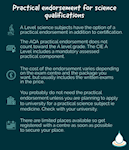A Level Biology
Complete online content made up of text, video and interactive activities for A level Biology - AQA or CIE
Absorb Online Learning Limited
Summary
Interest charges applied
No credit check required
Pay in four monthly installments of £96.69
...- Exam(s) / assessment(s) not included in price, and must be purchased separately
- Tutor is available to students
- TOTUM card available but not included in price What's this?
Overview
Biology is an introduction to the way life on our planet works. It’s an essential for those planning to pursue a career in medicine, work with animals or in the marine environment. This qualification opens doors to higher education, and is lasting proof on your CV of this level of intensive learning.
During A Level Biology you will explore biological molecules, genetic information and energy transfers you will go on to understand how this impacts how organisms respond to their environment, genetic populations and the control of gene expressions.
Upon successful completion of the exam and practical assessments (as administered by CIE), you will have achieved an internationally recognised CIE A Level Biology.
Free 24-hour trial available - simply enquire and this can be set up for you right away.
Qualification
Course media
Description
Outline
This A Level has the following main themes:
Cells as the units of life
A cell is the basic unit of life and all organisms are composed of one or more cells. There are two
fundamental types of cell: prokaryotic and eukaryotic.
Biochemical processes
Cells are dynamic: biochemistry and molecular biology help to explain how and why cells function as
they do.
DNA, the molecule of heredity
Cells contain the molecule of heredity, DNA. Heredity is based on the inheritance of genes.
Natural selection
Natural selection is the major mechanism to explain the theory of evolution.
Organisms in their environment
All organisms interact with their biotic and abiotic environment.
Observation and experiment
The different fields of biology are intertwined and cannot be studied in isolation: observation and
enquiry, experimentation and fieldwork are fundamental to biology.
Content
Candidates for Cambridge International AS Level Biology study the following topics:
1 Cell structure
2 Biological molecules
3 Enzymes
4 Cell membranes and transport
5 The mitotic cell cycle
6 Nucleic acids and protein synthesis
7 Transport in plants
8 Transport in mammals
9 Gas exchange and smoking
10 Infectious disease
11 Immunity
Candidates for Cambridge International A Level Biology study the AS topics and the following topics:
12 Energy and respiration
13 Photosynthesis
14 Homeostasis
15 Control and co-ordination
16 Inherited change
17 Selection and evolution
18 Biodiversity, classification and conservation
19 Genetic technology
You need to do the following exams:
Paper 1 Multiple Choice 1 hour
This paper consists of 40 multiple choice questions, all with four options. All
questions will be based on the AS Level syllabus content. Candidates will answer
all questions. Candidates will answer on an answer sheet. [40 marks] 15.5% of total course.
Paper 2 AS Level Structured Questions 1 hour 15 minutes
This paper consists of a variable number of questions, of variable mark value. All
questions will be based on the AS Level syllabus content. Candidates will answer
all questions. Candidates will answer on the question paper. [60 marks] 23% of total course.
Paper 3 Advanced Practical Skills 2 hours
This paper requires candidates to carry out practical work in timed conditions.
This paper will consist of two or three experiments drawn from different areas
of the AS Level syllabus. Candidates will answer all questions. Candidates will
answer on the question paper. [40 marks] 11.5% of total course.
Paper 4 A Level Structured Questions 2 hours
This paper consists of a variable number of structured questions each with a
variable mark value (Section A) and a choice of one free response style question
worth 15 marks (Section B). All questions will be based on the A Level syllabus
but may require knowledge of material first encountered in the AS Level syllabus.
Candidates will answer on the question paper. [100 marks] 38.5% of total course.
Paper 5 Planning, Analysis and Evaluation 1 hour 15 minutes
This paper consists of a variable number of questions of variable mark value
based on the practical skills of planning, analysis and evaluation. Candidates will
answer on the question paper. [30 marks] 11.5% of total course.
Skills Gained
- Understanding of how biological molecules and cells are formed and interact
- Understanding this demanding subject in context
- Applying the scientific methodology in biology
- Developing critical thinking skills
Assessment
These exams are administered by AQA or CIE. As a private candidate you will sit your exams in an exam centre such as a school, college or private tuition centre.
You will be charged and exam fee by your chosen centre. Fees vary across centres, but £220-280.00 is a sensible estimate for the written papers.
An additional fee will be charged for those wishing to take practical endorsements.
Absorb Online Learning provide a comprehensive guide to finding your most conveniently located centre, along with details of how and when to make your booking.
In addition, if you select the added tutor support there will be a number of tutor marked assessments (TMAs) to ensure that you have a thorough understanding of the content, with the tutor sending comments to guide you through any areas of potential difficulty. This will ensure you are prepared for the final exams.
All e-books contain a range of self-assessments that are indicators that you understand the materials as you work through them. These are for your own information.
How quickly can I complete the A Level?
You can complete your A Level as quickly or slowly within the two years as you choose. The recommended study time for the content is 360 hours. The exam dates are set by the exam boards and for A Level Biology are available in January and May/June each year. This gives you four opportunities to sit the exams over the two years.
Who is this course for?
For those with an interest in Biology.
Requirements
No prior qualification needed.
Career path
This A level is suitable for university access. It is also ideal for those seeking a career in medicine, nursing and other science related professions.
Questions and answers
Reviews
Currently there are no reviews for this course. Be the first to leave a review.
Legal information
This course is advertised on reed.co.uk by the Course Provider, whose terms and conditions apply. Purchases are made directly from the Course Provider, and as such, content and materials are supplied by the Course Provider directly. Reed is acting as agent and not reseller in relation to this course. Reed's only responsibility is to facilitate your payment for the course. It is your responsibility to review and agree to the Course Provider's terms and conditions and satisfy yourself as to the suitability of the course you intend to purchase. Reed will not have any responsibility for the content of the course and/or associated materials.














